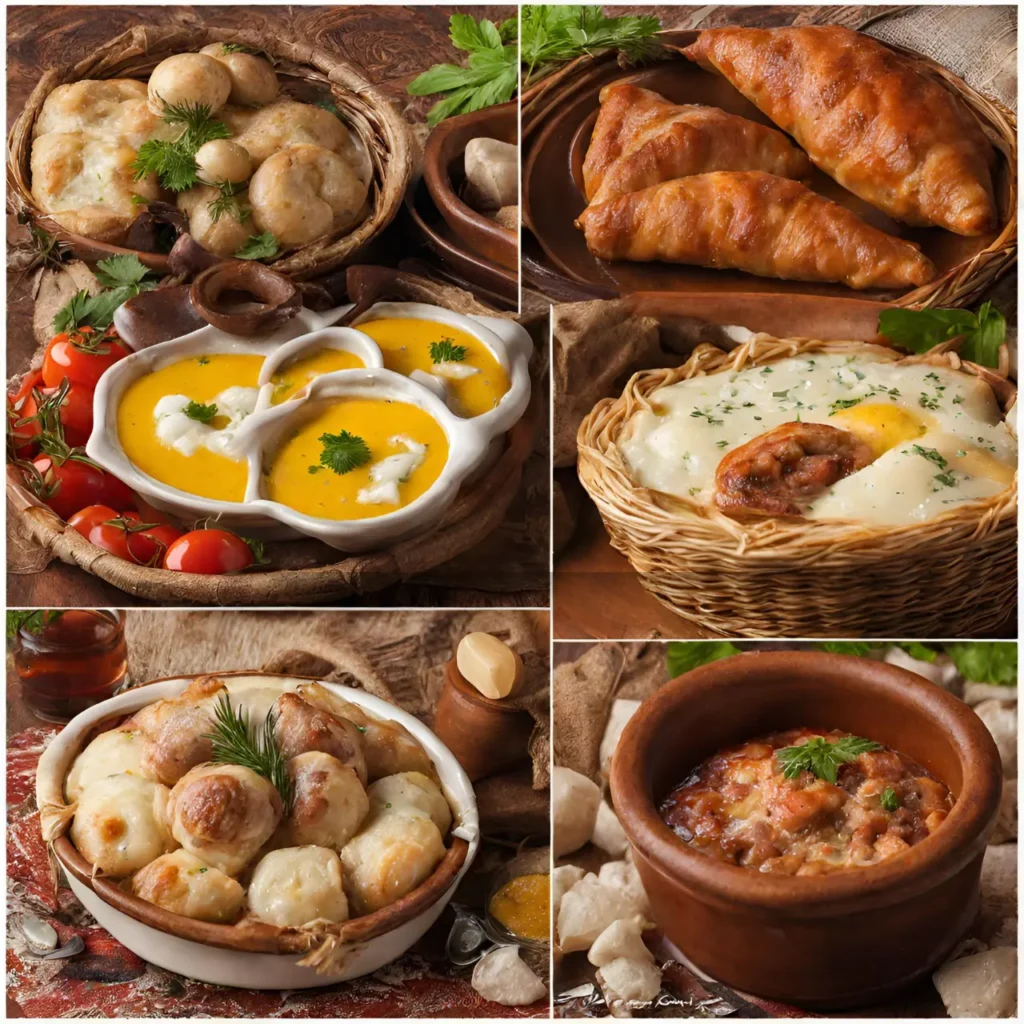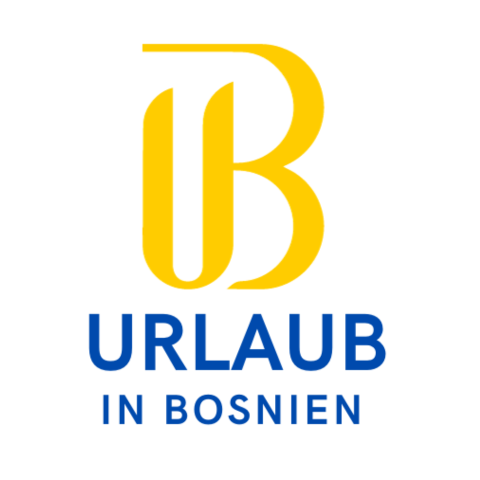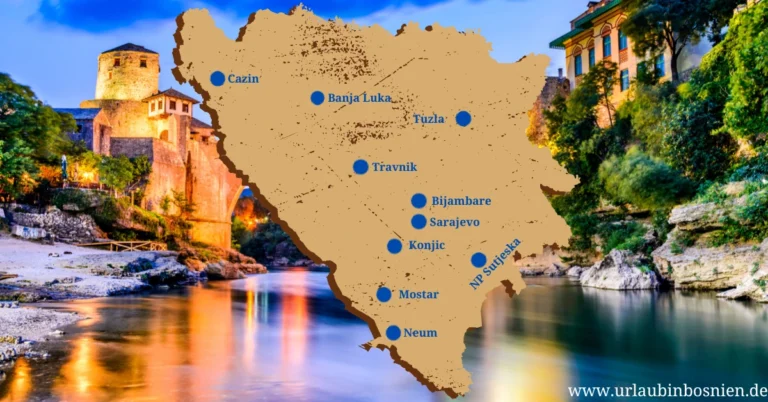Is it worth going on holiday to Bosnia?
I have always been an adventurer at heart and recently my curiosity took me to Bosnia. Let's debunk some myths and explore why this Balkan gem is worth your time.
From its rich history to diverse landscapes, delicious cuisine and vibrant city life, Bosnia has more to offer than you think. So pack your bags. We will reveal the hidden wonders of Bosnia and answer the question of why Bosnia should be your next holiday destination.

Understanding Bosnia: A brief overview
I would like to give you a brief overview here so that you can better understand the country of Bosnia. Nestled in the heart of Southeastern Europe, Bosnia, or more precisely Bosnia and Herzegovina, is a place where history and culture meet and create a rich diversity.
Bosnia's road to independence was no walk in the park. It was a struggle, marked by a brutal war after the breakup of Yugoslavia in the early 1990s. With Bosnia's independence, the country began a new path and established its unique political structure. An interesting fact, for example, is that Bosnia has not one, but three presidents! Each of these presidents represents the three main population groups in the country, the Bosniak, the Croatian and the Serbian population. This also reflects the diversity of the country's population.
Religion plays a significant role in shaping Bosnia's cultural landscape. It is a melting pot where Orthodox Christianity, Catholicism and Islam coexist peacefully, each leaving its indelible mark on the country's traditions and architectural styles.
In terms of economic progress, Bosnia has slowly gained momentum. Despite the challenges of a difficult recovery after the war at the end of the last century, Bosnia has shown resilience. It has exploited its potential in areas such as mining, agriculture and tourism and has gradually rebuilt itself economically.
The rich history and culture of Bosnia
I have always found Bosnia's history to be rich and complex, and its culture is no less captivating, combining influences from both East and West in a unique fusion. The Bosnian landscape is dotted with monuments to its diverse past, telling stories of the influence of the Ottoman Empire, various wars, and post-war recovery.
- Bosnian architecture is a testament to its rich history. From Ottoman-era mosques to buildings from the Habsburg monarchy, the architectural landscape in Bosnia is diverse and fascinating.
- Religious tolerance is an important aspect of Bosnian society. With mosques, synagogues and churches peacefully coexisting in close proximity, Bosnia demonstrates a harmonious fusion of faiths.
- Traditional customs are deeply rooted in Bosnian culture. Festivities, food, music and dance all play an integral role.
- The influence of the Ottoman Empire is evident in the country's cuisine, music, language and architecture. It is like a piece of the Middle East in the heart of Europe.
- Bosnia's post-war recovery is inspiring. Despite the devastating war in the 1990s, the nation has made significant progress in rebuilding, both physically and emotionally.
It amazes me how Bosnia has managed to preserve its cultural heritage while adapting to the new times. It is a country that has learned to adapt and grow in the most difficult circumstances. Bosnia's resilience, tolerance and cultural diversity make it a fascinating destination. From its impressive architecture to its traditional customs, it is a destination that truly offers a unique blend of East and West.
The diverse landscape of Bosnia
There is much more to Bosnia's diverse landscape than meets the eye. While it is known for its rich history and cultural heritage, Bosnia's natural beauty is often overlooked. But the stunning waterfalls, unique flora and fauna, and architectural aesthetics of its landscape are equally fascinating.
The waterfalls are a sight to behold. Imagine standing at the foot of Kravica and looking at the thundering waterfall cascading down from a height of 25 metres. The misty spray on your face is refreshing and the spectacle of the waterfall against the lush green landscape is a captivating sight.
The country's architectural aesthetic, heavily influenced by its Ottoman and Habsburg past, is another aspect of its charm. The stone houses with terracotta roofs that sit atop hills and in valleys are a testament to Bosnia's rich history and diverse influences.
The unique flora and fauna are worth mentioning. From brown bears and wolves in Sutjeska National Park to the diverse birdlife in Hutovo Blato Nature Park, Bosnia's wildlife is fascinating and diverse. And then there is the potential for winter sports. With its snow-capped mountains and numerous ski resorts, Bosnia offers winter sports enthusiasts an exhilarating winter landscape.
Finally, I cannot forget the agricultural traditions that have shaped Bosnia's landscape for generations. The sight of fields dotted with haystacks and the farmer at work is a reminder of the country's agrarian roots.
Bosnian cuisine

I explore the bold flavors of Bosnian cuisine, and it is as diverse and rich as the country's landscape. My journey through the Bosnian food scene was a mix of the familiar and the intriguing.
Bosnian cuisine is a mix of East and West, with influences from the Ottoman and Habsburg empires. A signature dish, 'Bosanski Lonac', is a testament to this. This hearty stew is slowly cooked in a pot, with a mixture of meat and vegetables layered in a specific order.
Street food culture thrives here. The smell of 'ćevapi', grilled minced meat usually served in a flatbread with onions and sour cream, wafts through the bustling markets. It's a must-try for any food lover.
Traditional drinks are an integral part of the Bosnian dining experience. Whether it's 'rakija', a strong fruit brandy, or 'boza', a sweet fermented drink, each beverage has its unique place in Bosnian culture.
And then there are the Bosnian desserts. 'Tufahija', a deliciously sweet apple filled with walnuts and whipped cream, and 'Baklava', a delicacy made of thin layers of dough filled with nuts and sugar syrup, are just a few examples of the sweet treats you can enjoy.
In summary, my culinary journey in Bosnia was a delicious one – filled with
- hearty stews cooked with traditional techniques
- a lively street food culture with 'ćevapi'
- traditional drinks such as 'rakija' and 'boza'
- delicious Bosnian desserts such as 'tufahija' and 'baklava'
- Signature dishes that tell the story of Bosnia
This is just a glimpse of what Bosnian cuisine has to offer. There is so much more to discover and I can't wait to continue my exploration.
City life in Sarajevo
It is now time to immerse yourself in the hustle and bustle of city life in Sarajevo, the heart of Bosnia. A city where East meets West, where the influence of the Ottoman Empire is as palpable as the modern European atmosphere. The city's architecture is a testament to this rich mix of cultures, with the old Ottoman old town seamlessly merging into districts of modern architecture.
Sarajevo's nightlife is a vibrant mix of cozy bars, vibrant clubs and quiet cafes, each offering a unique experience. I've found that whether you're enjoying a Bosnian coffee under the stars or dancing the night away to local tunes, the city's nightlife always manages to captivate you.
The art scene in Sarajevo is as diverse as its architecture. A walk through the city is a visual feast of street art, avant-garde installations and classical masterpieces in galleries. Sarajevo's art scene is not limited to galleries, it extends to the streets as well, making the city a dynamic canvas that tells its own story.
Festivals in Sarajevo add an extra dash of charm to city life. The city hosts a variety of events throughout the year, from the renowned Sarajevo Film Festival to lively music festivals and cultural fairs that embody the city's spirit of unity in diversity.
Essentially, Sarajevo city life is a beautiful blend of old and new, a symphony of cultures reflected in art, festivals, nightlife and architecture. A holiday here? I'd say it's a trip worth it.
Travel to the lesser-known cities of Bosnia
After walking through the heart of Sarajevo, I am excited to get off the beaten track and discover the charm of Bosnia's lesser-known towns. These hidden gem towns, largely untouched by commercial tourism, offer an authentic insight into Bosnian culture, local festivities, arts and crafts traditions and architectural wonders. Not to mention the picturesque Bosnian villages that are found in abundance.
To paint a picture:
- Imagine the cobbled streets of Počitelj, an architectural wonder with its medieval fortress overlooking the Neretva River. The town's stone houses, mosques and clock tower are a testament to Bosnia's Ottoman past.
- Then there is Blagaj, which lies at the foot of a rock where the Buna River flows out of a cave. It is known for its Tekija Monastery, a charming dervish house on the water.
- Heading north, you'll find Jajce, a town with a waterfall right in its center. It's also home to the Pliva Lakes, perfect for quiet boat rides and picnics.
- Another hidden gem, Visoko is known for its supposedly ancient pyramids, a subject of much heated debate among historians.
- Finally, the picturesque village of Lukomir, the highest and most remote village in Bosnia. The residents here maintain centuries-old craft traditions and make artistic woolen garments by hand.
- Participating in local festivities, exploring the arts and crafts traditions, strolling through architectural wonders or simply immersing yourself in the peaceful atmosphere of picturesque Bosnian villages, it is a trip that is both enriching and enlightening. Bosnia, with its lesser-explored towns, is truly a treasure trove waiting to be discovered, so if you are planning a holiday off the beaten track, Bosnia should be on your list.
Activities in Bosnia for the outdoor enthusiast
In addition to its cultural appeal, Bosnia offers a variety of activities for the outdoor enthusiast, from hiking in Sutjeska National Park to rafting on the Una River. It is a paradise for the adventurous spirit, with something for everyone.
For cycling enthusiasts, there are cycling trails that are a real treat, winding through the scenic countryside, along sparkling rivers and through ancient forests. The Vrbas River Trail is one of my favourites, offering scenic views of the river and surrounding hills, with the occasional adrenaline rush of a steep descent. It's an invigorating way to experience Bosnia's stunning scenery.
Rafting adventures are an absolute highlight. The Una River, with its crystal clear waters and challenging rapids, offers an unforgettable experience. It's a pulse-pounding, heart-pounding ride that will leave you grinning from ear to ear. And with experienced guides at the helm, it's safe even for beginners.
Mountain climbing is another fantastic way to immerse yourself in the natural beauty of Bosnia. The mountains here are rugged and majestic, offering exhilarating climbs and breathtaking views. Whether you're an experienced climber or a beginner, there's a mountain here that's just right for you.
Wildlife watching is another activity you shouldn't miss. Bosnia's forests are home to a variety of wildlife, from bears and wolves to lynx and numerous bird species. It's a nature lover's dream.
Finally, camping experiences in Bosnia are special. Camping under the stars, surrounded by the silence of nature, is an experience that will stay with you long after you leave Bosnia. It is a perfect way to cap off a day of outdoor adventure.
Practical information for a trip to Bosnia
- I have some essential tips for anyone planning a trip to Bosnia. With its rich history, stunning landscapes and warm people, Bosnia is a hidden gem in the heart of Europe. But like any foreign country, there are a few crucial things to keep in mind to ensure your trip goes smoothly.
- Bosnian etiquette: Bosnians are generally friendly and hospitable. It is customary to greet people with a firm handshake and to maintain eye contact during conversation. Respect for religious diversity is also of utmost importance here.
- Transport options: Bosnia's public transport system includes buses, trams and trains. Taxis are also available, but make sure they are licensed. Driving your own car is an option, but be aware that there can be challenging road conditions in rural areas.
- Visa requirements: German citizens do not need a visa to enter Bosnia and Herzegovina. They can stay visa-free for a maximum of 90 days within a six-month period. This also applies to most other European countries. However, you should check this with your embassy or consulate before travelling.
- Health precautions: Bosnia has good health facilities in larger cities, but less so in rural areas. It is advisable to take out travel insurance that covers health emergencies. Also remember to always stay hydrated and use sunscreen in summer.
- Currency exchange: The currency of Bosnia is the Bosnian Convertible Marka (BAM). It is advisable to exchange currency in banks or official exchange offices to get the best rates.






